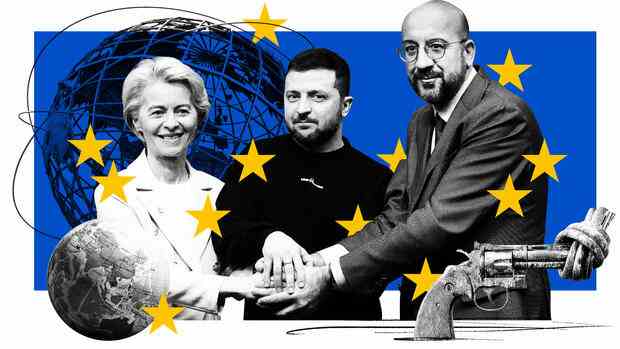Upgrading alone is not enough.
(Photo: Klawe Rzeczy, AP, Getty, Imago)
Anyone who follows Joe Biden’s visit to Kiev and Warsaw these days will see how the US President is showing Vladimir Putin through his presence alone – showing him that he miscalculated his war of aggression in Ukraine. Washington’s support is Kiev’s guarantee of survival.
Putin couldn’t really do anything to counter that in his speech to the nation on Tuesday. He resorted to a gesture of defiance to temporarily suspend the treaty limiting strategic nuclear warheads.
The duel between Biden and Putin also shows something else in this symbolic week, which marks the anniversary of the Ukraine invasion: the European dilemma. Washington and Moscow are talking to each other over the heads of Europeans. Putin never wanted anything else. The USA is making intensive efforts to coordinate with Europe, but this does not change the fact that nothing works without America.
Without Biden, Ukraine’s support would not have worked nearly as quickly and with as much impact. For all of this, Washington deserves European thanks.
With the equivalent of more than 73 billion euros in military, financial and humanitarian aid, according to data from the Institute for the World Economy, the USA has pledged more support for Ukraine than all EU countries combined. Even the decision as to whether Europe would send main battle tanks to Ukraine rested with Washington.
Upgrading alone is not enough as a lesson
At least since this war it has been clear: Europe needs a more independent foreign and security policy and, above all, it needs better defense capabilities. The long-discussed two percent of gross domestic product for defense spending, to which NATO member states have committed, is now defined as the lower limit.
Europe must now also strengthen its relations with countries in the Global South.
But upgrading alone is not enough. The European states must also network more closely, must coordinate the procurement of weapons and ammunition, bring them together in parts, must talk about a European defense umbrella, and strengthen their resilience against cyber attacks and disinformation.
They have to adjust to years of Russia’s containment policy. After all, you have to emancipate yourself a bit from the most important NATO partner, the USA, without distancing yourself.
It is not yet certain that a transatlanticist like Biden will stand by Europe after the US presidential elections in 2024. Washington’s strategic focus is clearly on Asia. That’s where the big growth is, that’s where the big rival China is.
A global focus on development brings new partners
The coming years are likely to be shaped more strongly than before by rivalries between great powers. A more independent European foreign and security policy therefore also includes a coherent European China strategy.
Europe must adjust to years of Russia’s containment policy.
Unlike in the USA, Europe is not about claiming global leadership. The EU does not have to follow every US sanction against China. But for more European sovereignty, the continent must at least reduce dependencies in critical areas, and ideally even eliminate them. That is the lesson from decades of all too naïve Russia policy, especially Germany.
However, Europe must also strengthen its relations with countries in the Global South, with countries such as India, Brazil, South Africa and Senegal. They become coveted geostrategic partners. Together with them, Europe can follow the defense push with a global development push, because that is the priority for these countries.
Europe must dovetail its economic, development and foreign policy. Achieving all of this at the same time is a major challenge. But being more united, sovereign and better connected globally is not an impossible mission for Europe.
More: China presents itself as a peacemaker in the Ukraine war
